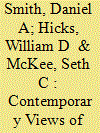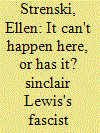|
|
|
Sort Order |
|
|
|
Items / Page
|
|
|
|
|
|
|
| Srl | Item |
| 1 |
ID:
177213


|
|
|
|
|
| Summary/Abstract |
What are Americans’ views on liberal democracy? Have their attitudes changed since the 1950s? How do their attitudes about liberal democracy shape political behavior, such as vote choice? We replicated McClosky’s (1964) seminal study on a module to the 2016 Cooperative Congressional Election Study. Our exploration of 26 survey questions reveals both continuity and change in Americans’ attitudes toward liberal democracy. Whereas Americans have become more hostile toward some standard democratic procedural rules of the game, we also find that they harbor more tolerant attitudes toward racial and ethnic equality. We subjected respondents’ answers to an exploratory factor analysis, which reveals three distinct dimensions regarding democratic values: elitism, authoritarianism, and racial supremacy. We find that elitism and racial supremacy significantly influenced political behavior in the 2016 presidential election and note that these factors contributed to mass unrest in 2020, exposing fault lines deeply rooted in America’s contentious political history.
|
|
|
|
|
|
|
|
|
|
|
|
|
|
|
|
| 2 |
ID:
152879


|
|
|
|
|
| Summary/Abstract |
Sinclair Lewis, the first American to win the Nobel Prize in Literature, anticipated many aspects of Donald J. Trump's 2016 campaign and election in his 1935 satirical dystopia, It Can't Happen Here. It was his most popular novel to date and is still satisfying, thought-provoking political theater. Lewis was influenced by growing totalitarianism in Europe, reported on by his second wife, foreign correspondent, Dorothy Thompson. Noting the power of Father Coughlin and Huey Long, among others, to mobilize a public still suffering from the Great Depression, Lewis feared a fascist takeover of the American government by democratic means. Lewis's fictional nightmare features a loutish, ignorant demagogue, who is manipulated by a sinister ghostwriter adviser. With support from a resentful League of Forgotten Men, the demagogue is elected President and quickly establishes a military, racist, and anti-Semitic dictatorship. It Can't Happen Here dramatizes the dire consequences of this takeover, which is not taken seriously at first by Lewis's newspaper editor protagonist, but then is increasingly resisted. Lewis is a social satirist in the Mark Twain tradition, and his novel is worth reading today for its suggestive parallels with current history and its good-hearted humor.
|
|
|
|
|
|
|
|
|
|
|
|
|
|
|
|
| 3 |
ID:
162854


|
|
|
|
|
| Summary/Abstract |
With the first female presidential candidate at the top of the Democratic ticket, the gender gap in 2016 was predicted to be the largest ever. Although the gender gap proved to be bigger than any other in recent history, with a majority of women voting for Hillary Clinton, a disaggregation of the vote by race indicated that not all women equally supported the female presidential candidate. This suggests the existence of a racialized gender gap not previously explored by extant research. Thus, this article explores the nature of this interracial gender gap by examining the political evaluations of men and women, by race, in the 2016 presidential election. Using data from the 2016 American National Election Study (ANES) Time Series Study merged with the ANES Cumulative Data File (1948–2012), predictors of the gender gap were explored and the circumstances under which an interracial gender gap can be narrowed were examined.
|
|
|
|
|
|
|
|
|
|
|
|
|
|
|
|
| 4 |
ID:
155249


|
|
|
|
|
| Summary/Abstract |
The 2016 presidential election demonstrated the rise of a “restraint constituency” in American politics that openly questions Washington’s bipartisan post-Cold War pursuit of a grand strategy of primacy or liberal hegemony. This constituency has been animated by the return of the Jacksonian tradition of American foreign policy, most notably in the candidacy of Donald Trump, which directly questions the benefits of alliance relationships as well as U.S. underwriting of an open global economic system. It also stresses the need for the United States to act unilaterally in defense of its core foreign policy interests. The resurgence of the Jacksonian tradition will make it difficult for the next President to reestablish a foreign policy consensus and combat perceptions of American decline.
|
|
|
|
|
|
|
|
|
|
|
|
|
|
|
|
|
|
|
|
|